Judge May Block Pennsylvania Voter ID Law
When we last discussed Pennsylvania’s controversial Voter ID law, the case challenging it had been sent back to the trial court by the Pennsylvania Supreme Court for a hearing on the question of whether or not an injunction should be granted barring the law from being enforced during the upcoming election. As I noted at the time, the manner in which the Supreme Court laid out the parameters of what the trial court was to determine appeared to make it very likely that an injunction would be granted unless the attorneys for the government could establish that authorities would be able to accommodate voters unable to obtain a proper form of identification before Election Day. Yesterday, a hearing was held in the matter and when it was over the Judge hearing the case dropped a pretty significant hint indicating that he’s likely to grant an injunction:
HARRISBURG – With just six weeks until the presidential election, a judge raised the possibility Tuesday that he would move to block Pennsylvania’s controversial voter ID law.
“I’m giving you a heads-up,” Commonwealth Court Judge Robert E. Simpson Jr. told lawyers after a day’s testimony on whether the law is being implemented in ways that ensure no voters will be disenfranchised. “I think it’s a possibility there could be an injunction here.”
Simpson then asked lawyers on both sides to be prepared to return to court Thursday to present arguments on what such an injunction should look like. There is no hearing Wednesday because of Yom Kippur.
Simpson gave few if any further clues to what he may decide. But his comments provided a dramatic end to a day of testimony in a protracted and widely watched fight over the law, which requires voters to present photo identification at the polls.
(…)
Lawyers fighting the law said they would ask Simpson on Thursday to block it from taking effect until there can be a full trial on its merits.
“The only proper course here is to enjoin the law,” said David Gersch, one of the attorneys for individual plaintiffs as well as civil-rights and civic groups such as the NAACP and League of Women Voters.
Alfred W. Putnam Jr., representing the Corbett administration, countered that officials had done all they could to ensure that every voter who needed a photo ID card can get one.
The latest effort was a step – formally announced Tuesday in court as the hearing began – to again relax requirements for residents seeking one of the state-issued photo IDs.
“The question raised is, is it too hard to get?” Putnam said in court of the voter ID cards. “And the answer is, it is not too hard to get.”
Under the new plan, which went into effect immediately, all voters will be able to apply for the voting-only picture ID by making one trip to a Department of Transportation licensing center, PennDot Deputy Secretary Kurt Myers testified later in the hearing as he detailed the new plan. He said the plan was implemented to address justices’ concerns about possible voter disenfranchisement.
Myers testified that voters will now be able to go to a PennDot licensing center and apply for a voting-only ID without first having to apply for the state’s nondriver ID, with its more stringent proof-of-identity requirements. Applicants also will no longer have to show proof of residence, though they will still be required to give their Social Security number.
If a voter ID application cannot be processed immediately, because of a problem matching either a person’s voter registration or Social Security information, PennDot will still take a voter’s photo and issue a card. The card will then be mailed to the voter at a later date, Myers testified.
Is that enough to qualify for the “liberal access” that the state legislature mandated in the law? Well, it strikes me as about as accommodating as the process can get and I’m not sure what they could do that would make it easier to get a card. At this point, though, with less than six weeks to go until Election Day, I suspect that the Judge may conclude that this process is insufficient to meet that requirement in the short amount of time between now and Election Day. What that means for the future of the law, of course, is an entirely different question.
This news comes on the same day as a new Washington Post poll showing that nearly three-quarters of all Americans support Voter ID laws:
Overall, there is high, strong and cross-party support for such laws, even though a slim majority of Americans say they have heard “not much” or “nothing” about the issue. Support dips among those who say they have heard more about new photo identification requirements but remains the majority position.
About half of those polled see voter fraud — people voting who are not eligible to do so or voters casting multiple ballots — as a “major problem” in presidential elections. One in three see it as a “minor problem.” The numbers are nearly as high when it comes to concern about eligible voters being denied their rights.
Asked to trade off the two, slightly more Americans are concerned with fraud than with voter suppression, although stark partisan and racial differences emerge. Two-thirds of Republicans see voter fraud as a bigger problem; nearly as many Democrats are primarily concerned with denying eligible voters access to the ballot box.
In the poll, African Americans are the most likely to see voter suppression as a major problem and the most likely to see support for the laws as an effort to boost one party over the other. Nearly six in 10 African Americans sense that support for the laws stems from partisan politics.
While 44 percent of Americans perceive partisan politics at play in the support of such laws, far more, 57 percent, see a genuine interest in fair elections as a big motivator.
A challenge for opponents of the ID laws is that a slim majority of Americans see politics behind the opposition, with fewer sensing it is motivated by a real interest in clean vote counts.
Legal challenges notwithstanding, we’re likely to see more of these types of laws in the years to come.
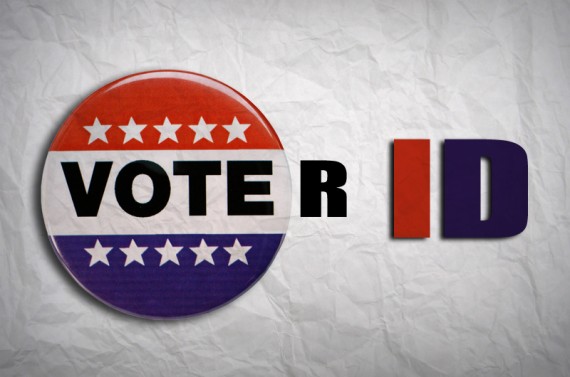

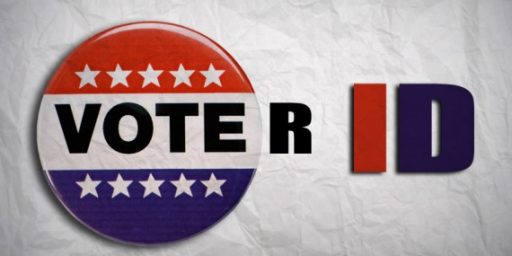
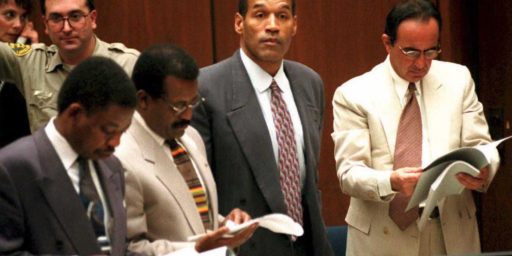
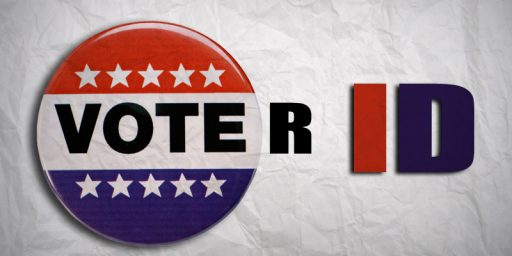
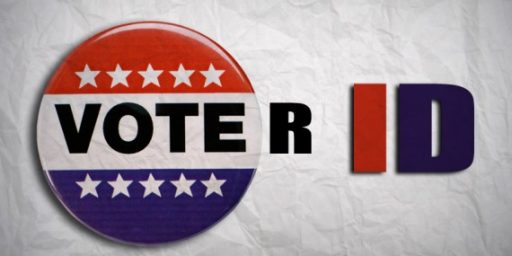

Yes, yes we are. Far too many people simply cannot or will not imagine how another citizen could possibly fail to have the ID required to vote (under these sorts of laws).
And, while I continue to agree with the opponents of such laws, frankly the best counter-attack the Dems can launch is to expand voter registration drives to include voter get-your-papers-in-order-so-you-can-vote drives. Which will be time and money-consuming, but a good investment.
How accommodating the process is is not the issue. The process that was in place before didn’t actually need to be changed – there was no significant issue of voter fraud going on, and no driving requirement to create a new process whatsoever. The problems right now are totally, 100%, the creation of the state of PA. And yet the voters are the ones who have to jump through hoops to do exactly what they were able to freely do before this ill-advised law came up? Bull.
If the “process” is anything less than 100% accommodating to the voters of PA, it should be thrown out as unconstitutional. It was unnecessary in the first place, and only developed for the single solitary purpose of actively discouraging and disenfranchising likely-Democratic voters. Period. Again I say, this is a problem they made for themselves. The voters shouldn’t be the ones who have to deal with the fallout from it.
I was completely wrong about the cause of global warming.
What’s the rush? Even if the voter ID law is constitutional, requiring it immediately when there are only 26 business days until the election is clearly a tactic designed to disenfranchise senior citizens, urban residents, college students, and others who do not currently have the required ID. If the judge orders the law to be implemented for the upcoming election, he will go down in history as a partisan hack.
Studies show voter fraud is almost non-existent. The PA law along with the laws being enacted in the swing states of Ohio and Florida are specifically meant to disenfranchise voters to win an election. Its not about voter fraud. They were so blatant as to even admit it in PA. It’s supported by the fact that “voter restrictions” are being enacted in GOP controlled states across the country. What does that tell you. If states feel they need to pass laws to ensure accurate and fair elections, then they must also revert to paper ballots and not rely on big GOP backer Diebold and their voting machines to count our votes
Pennsylvania’s voting system, prior to the new law, was working just fine. You had to prove your identity when you registered and sign a registration book when you voted, at which point your signature had to match the one from your registration. The neighborhood-based polls are also staffed by people who personally know many of the voters who show up, and they’re experienced enough to question anything that appears suspicious. Furthermore, the law includes stiff penalties: $15,000 fine and up to seven years in jail. You’d think the state could point to at least one case to prove its point that additional restrictions are needed. But it can’t.
Maybe this is the new journalism, but I couldn’t help but notice that you obviously quoted a news story, probably from a Pennsylvania newspaper, without any attribution. While naming sources is important from a journalism school point of view, it is also important to let readers know that the source of this extensive quote was reputable and perhaps even allow us to review the entire article. Oddly, you did tell us that the second quote was from the WaPo. I guess you figured that this source was reputable enough to make your opinions look more knowledgeable.